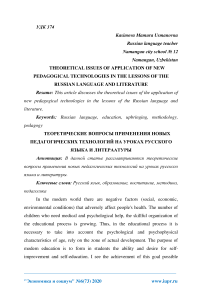Theoretical issues of application of new pedagogical technologies in the lessons of the Russian language and literature
Автор: Kasimova M.U.
Журнал: Экономика и социум @ekonomika-socium
Рубрика: Основной раздел
Статья в выпуске: 6-1 (73), 2020 года.
Бесплатный доступ
This article discusses the theoretical issues of the application of new pedagogical technologies in the lessons of the Russian language and literature.
Russian language, education, upbringing, methodology, pedagogy
Короткий адрес: https://sciup.org/140252375
IDR: 140252375 | УДК: 374
Текст научной статьи Theoretical issues of application of new pedagogical technologies in the lessons of the Russian language and literature
In the modern world there are negative factors (social, economic, environmental conditions) that adversely affect people's health. The number of children who need medical and psychological help, the skillful organization of the educational process is growing. Thus, in the educational process it is necessary to take into account the psychological and psychophysical characteristics of age, rely on the zone of actual development. The purpose of modern education is to form in students the ability and desire for selfimprovement and self-education. I see the achievement of this goal possible through the effective construction of the educational process, the creation of a favorable psychological climate, and the rational organization of the educational process.
The purpose of my teaching activity is to create conditions for the formation of key and subject competencies of students through the improvement of methods, forms of teaching the Russian language and literature by means of various types of art, through a combination of lesson and extracurricular activities. I see my mission as a teacher of Russian language and literature in the formation and development of a creative personality capable of selfdetermination, self-expression, self-development and self-realization, since it is primarily philological subjects that are called upon to realize the strategy and goals of school education. To show the practical value and the need for further life, to form a system of value orientations, including in a state of health. School graduates must be able to protect and strengthen their health.
Human health is an important indicator of his personal success. ”My task is to use the health-saving technologies to awaken in children a desire to take care of their health, based on their interest in learning. School life will be an essential condition for maintaining and promoting health. The novelty of the proposed experience lies in the fact that the use of health-saving technologies can increase students' interest in learning activities, provides for various forms of presentation and assimilation of program material, and includes great educational, developmental and educational potential. The practical significance of this problem lies in the fact that the use of health-saving technologies meets the modern requirements facing the school in the preparation of competitive, healthy citizens.
Russian is a serious and complex subject. Students have to write a lot, and therefore a vocabulary teacher should pay special attention to health-saving technologies. The Russian language is a rich language; it embodies all the wisdom and all historical experience of the people. In it there are winged expressions and sayings for all occasions. They can be combined into the Dictionary of Wise Thoughts. It is advisable that students start such a “Dictionary ...” and make notes in it:
“Healthy and sorrow is not grief, and misfortune is not a vow.”
“A apple a day - and the doctor is not needed”
“Eat simply - you will live up to a hundred years.”
“Healthy for food, but sick for work.”
“The patient is not tasty with honey, but healthy and he eats stone.”
“There is no price to health.”
“Health cannot be bought for money.”
You can’t do without the use of health-saving technologies in the lessons of the Russian language, because they, in turn, “work” on the assimilation of educational material and affect the quality of education. This issue must be considered in conjunction. The organization of the lesson is of great importance. The teacher builds the lesson in accordance with the dynamics of students' attention, takes into account the time for each task, and alternates types of work. So, for example, during an explanatory dictation it is advisable not only to explain spelling, punctograms, but also to conduct a morphemic, phonetic, lexical analysis.
Список литературы Theoretical issues of application of new pedagogical technologies in the lessons of the Russian language and literature
- Шермухамедова, Н. А. (2002). Некоторые суждения Абу-Насра аль-Фараби о соотношении логики и грамматики. Credo new, (2), 10-10.
- Шермухамедова, Н. А. (2019). ИННОВАЦИИ ОБРАЗОВАНИЯ, КУЛЬТУРЫ И НАУКИ КАК НЕОБХОДИМОЕ УСЛОВИЕ МОДЕРНИЗАЦИИ ОБЩЕСТВА. In ДИАЛОГ КУЛЬТУР И ВЫЗОВЫ СОВРЕМЕННОЙ ЭПОХИ (pp. 459-464).
- Shermuhamedova, N. A. (2018, July). Interrelation and Interdependence of Classic and Non-classic Epistemology. In Proceedings of the XXIII World Congress of Philosophy (Vol. 75, pp. 203-207).
- Стёпин, В. С., Чумаков, А. Н., Малюкова, О. В., Матронина, Л. Ф., Дудник, С. И., Драч, Г. В.,.. & Кудашов, В. И. (2017). О работе РФО размышляют. Вопросы философии, (11), 5-22.
- Шермухамедова, Н. А. (2016). ПРОБЛЕМЫ МОДЕРНИЗАЦИИ СИСТЕМЫ ОБРАЗОВАНИЯ И КУЛЬТУРЫ В СОВРЕМЕННЫХ УСЛОВИЯХ. In Культура диалога культур: постановка и грани проблемы (pp. 342-353).
- Шермухамедова, Н. А. (2015). Педагогическая деятельность в фомировании поликультурного мировоззрения. In Диалог культур: социальные, политические и ценностные аспекты (pp. 594-596).
- Шермухамедова, Н. А., & Науменко, О. А. (2014). ИНВАЙРОНМЕНТАЛИЗМ В РЕТРОСПЕКТИВЕ МОРАЛИ И КУЛЬТУРЫ ЭТНОСОВ В ЭПОХУ ГЛОБАЛИЗАЦИИ. Iмеждународного КОНГРЕССА "ПРОСТРАНСТВО ЭТНОСА В СОВРЕМЕННОМ МИРЕ", 339.
- Шермухамедова, Н. А. (2003). Культурно-исторический характер формирования научной картины мира. Credo new, (2), 7-7.
- Шермухамедова, Н. А. ГУМАНИТАРНОЕ ОБРАЗОВАНИЕ КАК ФАКТОР ФОРМИРОВАНИЯ ФИЛОСОФСКОГО МЫШЛЕНИЯ. ББК 87я43 И73, 331.
- Шермухамедова, Н. (2003). Философия и методология науки. Учебное пособие. Ташкент.
- Шермухамедова, H. (2005). Философия и методология науки (на узб. языке). Ташкент:"Изд. НУУз, 21-27.


